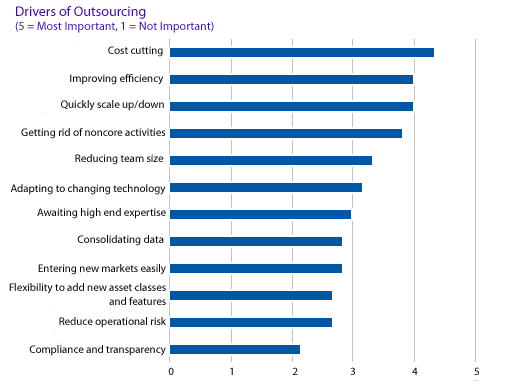Wealth Management Outsourcing: A Global Market Perspective
Abstract
In the aftermath of the financial crisis, wealth management firms are facing a number of challenges, including having to lower costs, improve efficiency, reduce turnaround time, scale up or down operations, mitigate risk, and adhere to stringent regulations. All of these have brought technology centre stage in managing financial institutions. Firms are finding it difficult to manage complex and diversified technology needs entirely in-house; many of them are increasingly looking at outsourcing as a viable alternative.
In a new report, Wealth Management Outsourcing: A Global Market Perspective, Celent discusses the adoption of outsourcing in the wealth management industry. Outsourcing has been in use in the financial services industry for quite some time. However, the wealth management services industry has been a laggard. Because of the privacy and confidentiality issues involved in this business, wealth managers have been reluctant to engage with third party providers.
The global financial crisis has changed that perspective and contributed to a major paradigm shift. Many wealth management firms are realizing the potential benefits outsourcing can offer. Most of the tier I and some tier II retail banks and insurance companies in the US, including their wealth management divisions, are outsourcing parts of their technology and operations infrastructure. Similarly tier I brokerages have also been outsourcing their technology needs and are fairly advanced. Europe lags the US in terms of the maturity of outsourcing practices. Due to stringent privacy requirements, especially in Switzerland, European firms still cannot outsource all of the same functionalities as US firms. Outsourcing has also not been as popular yet in Asia.

“The further a wealth management function is from client interfacing, the more likely it is to be outsourced,” says Arin Ray, Analyst at Celent and coauthor of the report, “Outsourcing in the areas of global custody, securities lending, client servicing, accounting, and settlement of trades in complex financial instruments, are relatively widespread, with managers taking a more aggressive approach to mainstream outsourcing.”
“IT budgets are expected to remain flat or decline in most markets, which will restrict firms’ ability to spend on technology,” says Alexander Camargo, Analyst at Celent and coauthor of the report. “However, this also means firms will have to do more with less. Outsourcing provides an option for increasing efficiency without needing significant investments in infrastructure.”
This report examines the trends, drivers, and state of outsourcing in the industry as well as the available opportunities across various market segments.

